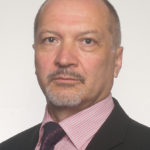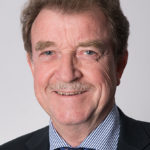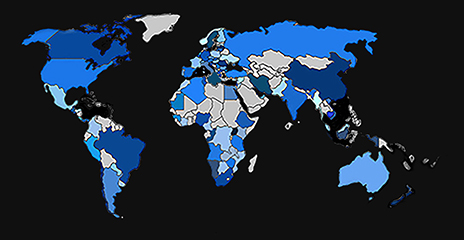
Ari Virtanen is a native Finn and has a degree both in engineering (B.Sc. Eng.) and business administration (MBA), with university level post graduate studies in organizational psychology, business law and administrative sciences. He has over 30 years of practical experience in leadership and in strategic and operative management positions in the international market place. He has lived over 14 years on four continents, in six countries and has developed customer or supplier relations in over 70 countries.
Prior to establishing his own consultancy firm, he worked over 20 years in MNE size enterprises in various positions, such as managing director, manager of procurement and logistics, sales and marketing manager and contractual maintenance manager. For the last 10 years, he has managed SME size companies with an international business scope.
Ari Virtanen is a certified Turnaround Management Consultant and is specialized in Interim & Crisis Management and Turnaround Management of underperforming companies, predominantly with an international business scope and companies in the transition processes towards international market place. He has also practical experience in insolvency and bankruptcy proceedings and related corporate restructuring, divestments and M&A processes.
Ari Virtanen has managed both sales offices and production companies (with LEAN and OEE philosophies, FMS and robotic production methods) and has relocated several factories to new locations nationally and abroad. He has been in charge of a number of Post- acquisition takeover cases in Latin America, Africa and East Europe. He can manage business relations and lead the companies and processes in Finnish, English, Estonian, Spanish and Swedish languages.
Ari Virtanen joined CBA as associated Mergers and Acquisitions Adviser in December 2015.

The company is a leader in liquid fuel management, monitoring and control solutions for the safe and efficient handling of fluids at the commercial and retail points of consumption.
26 employees work with manufacturing operations in the city of Buenos Aires, Argentina and sales in Argentina, Uruguay, Paraguay and other Latin American Countries. Manufacturing facilities are strategically located nearby the main highway running across the City of Buenos Aires which facilitates logistics and contact with clients. The market, since this is a niche market, there is not much space for other companies to challenge the share held by the seller, if the customers are satisfied at a reasonable price.
Two powerful drives are present in the market served by the company:
Environmental concerns
Most of the old installations are outdated in their designs and under the risks of fuel spills. The oil companies are then in the need of permanently refurbishing their service station networks. Plans for updates are being put together by oil companies every year on an annual basis.
Land is steadily increasing in value
In populated areas service stations are poorly competing for the land with the real estate business, and considering moving to the outskirts, where land is cheaper and roomier. Therefore, construction of new sites will continue to be on a high demand in the future.
Highlights:
160 plus products are offered to the constructors of service stations, 75% of them are designed and manufactured by the company.
The company is ISO-9001 – 2008 certified, to ensure that the highest levels of quality are maintained from concept through the entire product life cycle.
Core Competencies: Advising for the best components for a given layout demanded by contractors. Minimising the time between the broad lines of a project and the fulfilment of a final order. Quick design of sudden changes in needs of oil companies for their downstream operations.

Daimler Financial Services AG has announced it plans to acquire the electronic payment services provider PayCash Europe SA. The move is a sign of the increasing competition among makers looking for ways to allow users of mobility services, such as ride-sharing, car-sharing, etc. to pay for those services. The Detriot Bureau

Google has agreed to acquire Fabric, Twitter’s application development platform for an undisclosed amount of cash. Once the deal is approved, Fabric's team will join Google’s Developer Products Group and work with the company's Firebase application development platform team. eWeek

by Jackie Bojor, CBA Associate in Bucharest, Romania
Romania is one of the most preferred near-shore locations, capitalizing on the solid education system, with a strong focus on IT and finance & accounting and, therefore, providing a steady, inexpensive and qualitative flow of skilled resources to meet the growing demand of SSC/ BPO entities.
Cultural compatibility and a large scale of foreign language skills, covering English, French, Spanish, Italian, German, Portuguese, Hungarian, Czech, Slovak, Bulgarian and Russian, provide a competitive edge to the Romanian work force.
The Romanian BPO market includes more than 250 companies that activates in the business service sector. More than 64,000 university graduates form the talent pool of the sector.
According to sector experts, the market of outsourcing and support services in Romania is estimated at over 1.5 billion EUR.
The Romanian outsourcing market has recorded a significant growth in the recent years. The Romanian BPO industry is consolidating its position as one of the leading outsourcing markets in Europe, due to the technical and language skills of the employees and the competitive labour costs.
The outsourcing sector in Romania is characterised by:
- good availability of qualified resources
- language proficiency
- low labour costs
- strong IT infrastructure
According to the Association of Business Service Leaders in Romania (ABSL), over 109,000 persons are employed in companies operating in the outsourcing sector, representing 1.3% of the Romanian working population. The Romanian market includes over 250 companies activating in the business service sector. According to ABSL, the average attrition rate in the business services sector in Romania is 17 - 23%.
The jobs created in the business services sector in Romania have recorded a Compound Annual Growth Rate of 33% during 2013 – 2016, according to ABSL.
The players active in the Romanian Business Process Management industry are characterised by continuous business process improvement, high quality of services, technological and process innovation and ability to meet the market new requirements.
The significant development of the private healthcare sector in Romania in the last years has had a positive influence on the growth of the BPO industry,
1. Main services and sectors
According to an ABSL and KPMG report in 2016 carried out by interviewing 36 outsourcing companies operating in Romania, the main sectors serviced are:
• banking, insurance, financial services: 16%
• technology and telecom: 15%
• industrial and consumer goods: 14%
• business and professional services: 13%
• consumer services (including media, retail, travel and leisure): 11%
• energy, utilities and basis materials: 11%
• healthcare: 8%
• public sector: 5%
• others (transportation, logistics, pharmaceutical, gaming and betting, airport management, automotive, audit etc): 7%
The clients of the domestic business services providers are mainly located in Western Europe and CEE, including Romania. Furthermore, the domestic business services providers have clients located in North America, South America, Middle East, Africa and Asia Pacific.
2. Recent new entries on the market
Romanian BPO sector attracts numerous foreign investment, both greenfield and crossborder M&A.
In regards to M&A, for example, global BPO player Telus International has acquired in 2012 CallPoint New Europe, a successful regional BPO provider with operations in the CEE region, including in Romania. CallPoint New Europe has been established in 2004.
NTT DATA Corporation has acquired in 2013 the local company specialised in providing near-shore IT services for international customers EBS Romania. With headquarters in Cluj Napoca (NW Romania), EBS has outsourcing experience in the
segments of software engineering, software testing, quality assurance and application management and support.
Several local BPO and call centers activate as independent players on the market and operate quite successfully, reaching turnovers of between 2.5 and 15 MEUR.
3. Expected evolution for next years
According to an ABSL and KPMG report in 2016, the 36 outsourcing companies operating in Romania that have participated at the survey have the following plans for the next two years:
- 19 companies have expansion plans (52.8%)
- 14 companies have expansion plans, combined with stabilisation and optimisation of current activities (38.9%)
- 2 companies have plans for stabilisation and optimisation of current activities (5.5%)
- 1 company has no plans to change its current activities (2.8%)
According to ABSL, the number of jobs in the business services sector in Romania is estimated to reach 200,000 by 2020.
Future legislative and fiscal changes are expected to support the growth of the outsourcing market in Romania:
- increased fiscal incentives
- flexibility in hiring and terminating labour contracts
- access to grants and subsidies
- increased government support
- decreased corporate and labour taxation
- facilities for headcount increasing
flexibility in arrangements for night shifts
4. Main players
Some of the most active BPO players in Romania are Genpact Romania, Computer Generated Solutions Romania, Accenture Services, Webhelp Romania, Wipro Technologies and WNS Global Services Romania. FRD Center has analysed their financial performance and activities.

India and Japan have embarked on new scales of co–operation following the meetings between Prime Minister of India and Japan in the last three years. Given this context, India and Japan, as the 2nd and 3rd largest economies in the Asia Pacific region, are close partners for growth. The two-way trade between India and Japan currently stands at USD 14.51 billion. The Comprehensive Economic Partnership Agreement between the two countries that became operational from August 2011 is expected to provide the essential boost to bilateral economic relations.
India is one of the largest countries in the world with a population of over 1.3 billion, and a huge customer base. Given our liberalised foreign direct investment (FDI) policy, India has business relations with Japan for long. Ever since 1991, the Indian Government's liberalised approach and robust business opportunities have strengthened the faith of Japanese investors in India. Japanese brands have lined up to invest in India as the Government opened more sectors to foreign investment.
CBA Associate in India, Manan Agarwal and KrayMan Consultants are working as an accounting firm mainly for Japanese companies in India. They assist Japanese companies in exploring the Indian Market, setting-up their presence in India in the form of representative office / branch office / company, etc., and help them with incorporation activities, legal requirements, accountancy, audit and tax matters.
Manan Agarwal would like to leverage this platform by CBA and seek mutual opportunities of working together on any inbound investments into India. It will be a win-win situation for CBA in Japan to source companies from Japan to invest into India, and CBA India could be your counterpart in India helping such clients explore, set-up presence and do business in India.
KrayMan Consultants LLP, an accounting firm in India providing Audit, Tax & Advisory, services, founded by ex-EY (Ernst & Young), BMW & Grant Thornton professionals, is a team of around 25 professionals including Chartered Accountants, Company Secretaries, MBAs and support staff. They have a detailed presentation on ‘Doing Business in India’ and ‘Japan Desk Brochure’ to share for interested parties.

Attorney-at-law in Belgrade, Serbia, Milan Samardžić is a partner at SOG / Samardžić, Oreški & Grbović Law Firm. His practice focuses on corporate/M&A, banking & finance and legislative & government affairs.
Milan represents corporate clients and financial institutions in a wide variety of matters, including cross-border and international mergers and acquisitions, privatizations, general corporate issues, debt restructuring and refinancing.
Milan has been practicing law for over 12 years, mostly in Belgrade but also spent 2 years practicing in Austria, working for DLA Piper’s Vienna office. During this time, he advised and represented a large number of international investors in Serbia and the SEE region.
Milan has significant experience in advising clients on large-scale M&A and banking and finance projects, energy and infrastructure projects, PPPs, and joint ventures. Milan worked on projects across a variety of industries, including oil, gas and petrochemicals, power generation, transportation, and water. Some of his most recent experience includes acting for Etihad Airways regarding its strategic partnership with the Government of Serbia and acquisition of a 49% interest in Air Serbia, the national air carrier; acting for EBRD in respect of several loans made to commercial banks in Serbia to support the SME sector; advising a leading regional financial group on all aspects of its leasing and project finance operations in Serbia; acting for a leading Austrian investment bank on the potential acquisition of a major Serbian confectionery manufacturer; advising a leading international bank on Serbian law aspects of online gambling operations in Serbia; participated on an EBRD project in connection with the adoption of new amendments to the Mortgage Act in Serbia, in cooperation with the Association of Banks, the relevant ministries and other stakeholders.
Previously, Milan worked as the Managing Partner of Specht Rechtsanwalt GmbH Belgrade office for 3 years where he advised and represented clients on matters including project financing, foreign investment, corporate & commercial law, M&A and privatization. He also served as Head of Legal Committee of the Serbian Foreign Investors Council (FIC) and adviser to the Minister of International Economic Relations in a complex international project finance/concession transaction.
Milan graduated from the University of Belgrade, Faculty of Law and earned his LL.M. from Georgetown University Law Centre in Washington D.C. (with Honours as a Ron Brown Fellow and with the Cali Award for best examination results in International Project Finance and Investment).
Milan Samardžić published articles on topics of joint stock company takeovers, cartel enforcement and international investment.

Jürgen Schlichting has extensive experience in the design and implementation of international projects, in management and corporate governance, and in cross-border business development for products and services. Clients have been international institutions (World Bank, EU, various ministries in Germany and abroad) as well as private companies of many different sectors. After many years of rendering services in countries abroad (Latin America, Asia, and Europe), today he is active with international market development and the formation of branch offices and subsidiaries in Switzerland and abroad, as well as with selected mandates as board member (executive and non-executive) of medium-sized companies.
Jürgen Schlichting is Managing Director and owner of SBC International GmbH, a small Swiss-based consulting firm with focus on (a) cross-border business development, (b) strategic planning + coordination of complex international projects, and (c) corporate supervisory and control. Some important mandates were: Market positioning, establishment of companies + JV, market screening +selection of partners in many countries: Belgium, Czech Republic, Germany, Bulgaria, Brazil, India, Middle East. Support of corporate units in 20 countries in the context of a long term globalisation strategy; Elaboration of corporate strategy focusing on core competences and market positioning; Acquisition of companies: analysis of competition and selection of targets; Preparation of initial public offering: management, organisation and market positioning; Market analysis for investment goods (worldwide); Marketing strategy for Brazilian companies in Germany + Europe; Setting up of Swiss subsidiaries. Clients: ABB, Deutsche Telekom, Equinix, Linedata Services, Postbank, TÜV Rheinland, World Bank, Interamerican Development Bank (IDB), Commission of the European Community, KfW, GTZ, Asian Development Bank (ADB), amongst others.
He studied economics at the Universities of Freiburg (Germany) and Basel (Switzerland), with a final examination: lic.rer.pol. from the University of Basel/Switzerland.
Jürgen Schlichting joined CBA in November 2015 as Consulting Professional and M&A Adviser.

You can access 2 million apps on your mobile devices, but what are they good for when the battery runs out? Nada, says entrepreneur Mario Aguilera, who learned the drawbacks of quick-draining batteries the hard way in the late 1990s while serving in the Bolivian army. Often living off the grid for weeks at a time with his special forces unit, he would become frustrated when his trips into the wilderness were cut short because he had to return to base and wait for his handheld GPS tracker and satellite phone to recharge.
Aguilera was in the jungle when it dawned on him that the answer to his problem was shining above his head. “Everything is going mobile, our computers and phones are mobile, so logic dictates that the most important part of technology — energy — has to go mobile, too,” he says. After he left the army, he founded the “mobile energy” company Tespack in Helsinki in 2013.
Tespack has developed a range of fast-charging mobile products to generate and store energy, including backpacks with removable solar panels and power packs. The target market for his products have been hikers and climbers who need smartphones for navigation and emergencies, as well as military and aid personnel who work in remote locations or in extreme weather.
Now, solar-powered batteries are hardly newsworthy. But Aguilera says his solar panels are unique on the market because they combine light weight, design and durability with efficiency — the amount of solar energy converted into electricity. Tespack’s clock in at 22%, much higher than average. He says that his customers already include the Finnish Defense Forces and the UN. But Aguilera’s ultimate goal is to “allow everyone to stay charged and become energy independent the moment they step outside of their homes”.
He is onto something. Dying batteries have long been a source of consumer frustration. In 2014, the research company GMI surveyed 1,000 people in Britain, and 89% cited battery life as the most influential factor when picking a device. Among the 18- to 24-year- olds polled, 29% ran out of power at least once a day.
Tespack works inside GE’s Energy Village, an incubator in Helsinki that currently houses about 10 startups and is recruiting more. GE’s “village chief,” Mikko Kauppinen, started the programme last year. A similar project, the Health Innovation Village, has already yielded several successful products.
Like other members of the village, Tespack has received help from GE energy experts who stop by to see their progress. “We show them what we are working on and they provide mentorship to validate our thoughts, because all of our ideas are new and experimental,” Aguilera says.
Because Tespack is a member of the energy village, its future products might one day be available to GE’s customers. For now, most of its products are aimed at consumers and are priced at below $104, including a solar panel the size of an airplane window. The panel connects with a portable battery that stores enough energy to charge a laptop up to two times, a tablet up to five times and a phone up to 13 times.
The company’s waterproof, scratch-resistant solar panels also can be swapped into any of Tespack’s bags. The wearable panels weigh just a half-pound each and can connect to one another. Several linked panels create what Aguilera describes as “a mobile, solar power plant.”
In 2017, the company will launch a series of products aimed at consumers in cities, including a palm-sized, USB-charged, portable power bank that charges in less than 7 minutes and can power a smartphone. Says Aguilera: “As technology evolves, we believe that in 20 years you will be able to charge everything while on the move.” Link
Source: GE
